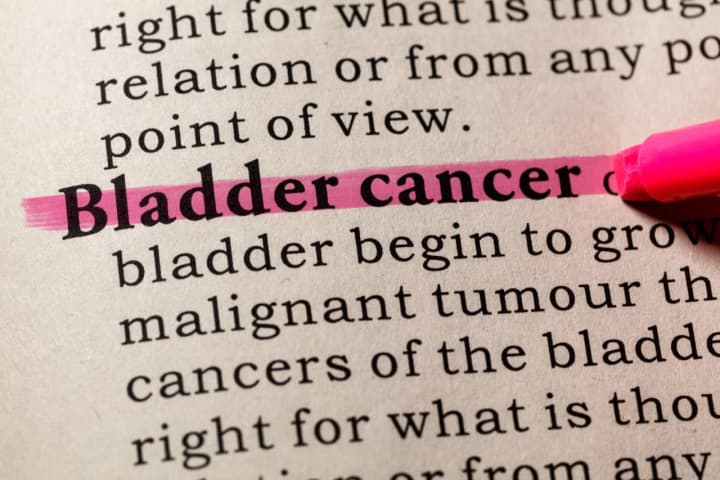Bladder cancer begins when the cells lining the walls of the bladder begin to grow at a rapid rate. The majority of bladder cancers that develop are superficial, meaning they do not penetrate the walls of the bladder, and are in turn highly treatable. However, if not identified, a small percentage of cells can invade deep into the walls of the bladder and spread to other organs before it is discovered.
Unfortunately, symptoms may not be easily recognizable. The most common warning sign is passing blood or blood clots in urine, and should always prompt medical evaluation. Other symptoms may include irritation or pain when urinating, urgency to urinate and frequent urination. Since these symptoms are also common in other conditions such as an enlarged or inflamed prostate or urinary tract infections, it is important to see a doctor or urologist for evaluation of any of these symptoms.
Most people diagnosed with bladder cancer are over the age of 55, but it can strike people at any age. Men are more likely than women to develop bladder cancer, and it most commonly affects Caucasians.
The single greatest risk factor is smoking, which is responsible for half of all bladder cancers in both men and women. Exposure to certain industrial chemicals, having a bladder defect, a family history of bladder cancer or a genetic syndrome linked with bladder cancer (such as Lynch syndrome), exposure to radiation or some medications are also risk factors.
Treatment depends on the speed of diagnosis. The treatment of superficial bladder cancer is done by a urologist, and involves removal of the tumor by cystoscopy, or placing medication into the bladder. Treatment for more advanced stages may include chemotherapy, surgery to remove the bladder, radiation therapy, immunotherapy or a combination of these procedures.
Radical cystectomy, which is a complete removal of the bladder and surrounding lymph nodes, has the best chance of curing an aggressive bladder cancer that has penetrated the muscular wall of the organ but not metastasized to other sites. Fortunately, robotic surgery is now successfully used to perform many cystectomies, delivering better outcomes, fewer complications and a quicker recovery. There are also a number of ways the urinary tract can be reconstructed to permit near-normal bodily functions after removal of the bladder.
There has been great progress in the treatment of both superficial and invasive bladder cancer, enabling physicians to effectively treat the disease while doing their best to preserve bladder function and maximize quality of life. Physicians and clinical researchers at NewYork-Presbyterian are at the forefront of many of these treatments.
NewYork-Presbyterian (NYP) Cancer Centers provide high-quality, comprehensive cancer care at convenient locations throughout the New York metropolitan area, Westchester and the Lower Hudson Valley. NYP Cancer Centers provide a comprehensive program of cancer services in a state-of-the-art, comfortable environment. Board certified medical, surgical and radiation oncologists collaborate with a multidisciplinary team of cancer specialists to provide each patient with an individualized plan of care. To find a location in your area visit nyp.org/cancerlocations.
NewYork-Presbyterian is one of the largest and most comprehensive hospitals in the nation, ranked New York’s No. 1 hospital for the 16th consecutive year, and No. 6 in the United States, according to U.S. News and World Report. Affiliated with two academic medical colleges – Columbia University College of Physicians and Surgeons and Weill Cornell Medicine, NewYork-Presbyterian brings together internationally recognized researchers and clinicians to develop and implement the latest approaches for prevention, diagnosis and treatment. The Herbert Irving Comprehensive Cancer Center at NewYork-Presbyterian/Columbia University Medical Center is one of only three NCI-designated comprehensive cancer centers in New York State. NewYork-Presbyterian provides comprehensive cancer care at all of our locations across the New York Metro area including Westchester County and the Hudson Valley. Learn more at nyp.org/cancer.
.



